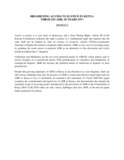| dc.description.abstract | Access to justice is a core tenet of democracy and
a basic Human Right. Article 48 of the
Kenyan Constitution enshrines the right to justice
as a fundamental right and requires that the
same shall not be limited by time or scarcity of re
sources. Article 159(2)(c),enumerates
Alternative Dispute Resolution (commonly abbreviate
d to ADR) as one way of accessing justice
by granting the courts power to promote ADR as an a
lternative to the adversarial and overly
technical method that is litigation.
Arbitration and Mediation are the two most preferre
d means of ADR by which parties seek to
resolve disputes of a commercial nature. With globa
lization of commerce and multiplicity of
commercial disputes, ADR has become the preferred m
ode of settlement of disputes in most
jurisdictions.
Despite the growing popularity of ADR in Kenya as a
n alternative to court litigation, there are
still serious challenges that face the practice of
ADR.A sound and effective legal framework for
ADR in Kenya is key to facilitation of commerce and
attainment of Vision 2030.This paper
examines the constitutional and legal basis of ADR
in Kenya, and demonstrates that despite the
expanded scope of accessing justice introduced by t
he provisions of ADR in the Constitution of
Kenya 2010 (CoK 2010) there are still various chall
enges that face ADR, at the end the paper
makes proposals for reform. | en_US |

